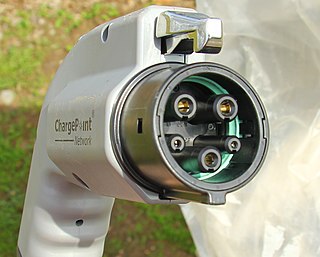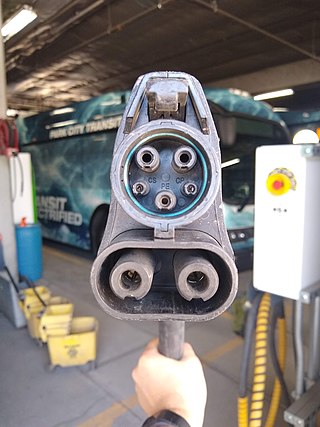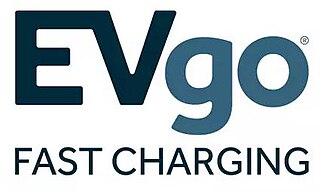Avcon is a company that manufactures charging interfaces for battery electric vehicles (EV). The lettering convention is Avcon for the company and AVCON (capitals) for the EV charging connector.

A charging station, also known as a charge point, chargepoint, or electric vehicle supply equipment (EVSE), is a power supply device that supplies electrical power for recharging plug-in electric vehicles.

An electric vehicle charging network is an infrastructure system of charging stations to recharge electric vehicles. The term electric vehicle infrastructure (EVI) may refer to charging stations in general or the network of charging stations across a nation or region. The proliferation of charging stations can be driven by charging station providers or government investment, and is a key influence on consumer behaviour in the transition from internal combustion engine vehicles to electric vehicles. While charging network vendors have in the past offered proprietary solutions limited to specific manufacturers, vendors now usually supply energy to electric vehicles regardless of manufacturer.

SAE J1772, also known as a J plug or Type 1 connector after its international standard, IEC 62196 Type 1, is a North American standard for electrical connectors for electric vehicles maintained by SAE International under the formal title "SAE Surface Vehicle Recommended Practice J1772, SAE Electric Vehicle Conductive Charge Coupler".

CHAdeMO is a fast-charging system for battery electric vehicles, developed in 2010 by the CHAdeMO Association, formed by the Tokyo Electric Power Company and five major Japanese automakers. The name is an abbreviation of "CHArge de MOve" and is derived from the Japanese phrase "o CHA deMO ikaga desuka" (お茶でもいかがですか), translating to English as "How about a cup of tea?", referring to the time it would take to charge a car.

IEC 62196Plugs, socket-outlets, vehicle connectors and vehicle inlets – Conductive charging of electric vehicles is a series of international standards that define requirements and tests for plugs, socket-outlets, vehicle connectors and vehicle inlets for conductive charging of electric vehicles and is maintained by the technical subcommittee SC 23H “Plugs, Socket-outlets and Couplers for industrial and similar applications, and for Electric Vehicles” of the International Electrotechnical Commission (IEC).

The Combined Charging System (CCS) is a standard for charging electric vehicles. It can use Combo 1 (CCS1) or Combo 2 (CCS2) connectors to provide power at up to 350 kilowatts (kW) . These two connectors are extensions of the IEC 62196 Type 1 and Type 2 connectors, with two additional direct current (DC) contacts to allow high-power DC fast charging. In response to demand for faster charging, 400 kW CCS chargers have been deployed by charging networks and 700 kW CCS chargers have been demonstrated.

The IEC 62196 Type 2 connector is used for charging electric vehicles, mainly within Europe, as it was declared standard by the EU. Based on widespread red IEC 60309 three phase plugs with five pins, which come in different diameters according to maximum current, a single size was selected, as maximum possible power will be communicated to the car via two additional communication pins and by a simple resistor coding within the cable. The onboard charger inside the car has to limit the current accordingly.

EVgo is an electric vehicle DC fast charging station network in the United States, with more than 950 charging locations as of August 2023. The company's charge stations are located in 35 states and are compatible with all major auto manufacturers.
The electric vehicle industry in India is slowly growing. The central and state governments have implemented schemes and incentives to promote electric mobility, and have introduced regulations and standards. Although India would benefit from converting its transport from internal combustion (IC) engines to electric motors, challenges include a lack of charging infrastructure, high initial cost and a lack of renewable energy. E-commerce companies, car manufacturers, app-based transport network companies and mobility-solution providers have entered the sector, however, and are slowly building electric-car capacity and visibility.
Chargemaster Limited is a supplier of charging infrastructure for electric vehicles, based in Milton Keynes, England. It provides charging units for home, business and public use, and operates its own electric vehicle public charging network, which is the largest network in the United Kingdom.

Pod Point is a UK provider of electric vehicle charging station. It provides charging units for home, business and public use. Since forming in 2009, Pod Point has manufactured and sold over 220,000 charging points. It has also developed one of the UK's largest public networks, connecting EV drivers with charging stations nationwide at locations such as Tesco, Lidl, Sainsbury's, Center Parcs and Southern Rail. Since 2014, when it signed a partnership with automaker Nissan, it also operates in Norway.

SAE J3068 "Electric Vehicle Power Transfer System Using a Three-Phase Capable Coupler" is a North American recommended practice published and maintained by SAE International. J3068 defines electrical connectors and a control protocol for electric vehicles. It has the formal title "SAE Surface Vehicle Recommended Practice J3068". J3068 defines a system of conductive power transfer to an electric vehicle using a coupler capable of transferring single-phase and three-phase AC power as well as DC power, and defines a digital communication system for control. J3068 also specifies requirements for the vehicle inlet, supply equipment connector, mating housings and contacts.

Electrify America, LLC is electric vehicle DC fast-charging network in the United States, with more than 850 stations and over 3,700 connectors as of December 2023. It is a subsidiary of Volkswagen Group of America, established in late 2016 by the automaker as part of its efforts to offset emissions in the wake of the Volkswagen emissions scandal. Volkswagen, as part of its settlement following the "Dieselgate" emissions scandal, invested $2 billion in creating Electrify America. In June 2022, Siemens became a minority shareholder of the company. Electrify America supports the CCS and CHAdeMO connector types with plans to add NACS connectors starting in 2025. Electrify America has been the target of significant criticism for the perceived lack of reliability and maintenance of its stations.
The GB/T charging standard is a set of GB/T standards, primarily in the GB/T 20234 family, for electric vehicle AC and DC fast charging used in China. The standards were revised and updated most recently in 2015 by the Standardization Administration of China. The term is an abbreviation of 国标推荐 (guóbiāo/tuījiàn), translated as "recommended/voluntary national standard".

The ChaoJi connector, also referenced as CHAdeMO 3.0, is an ultra-high-power charging standard charging electric cars, released in 2020. The connector has a lemniscate shape (∞), with a flat bottom edge and is planned for charging battery electric vehicles at up to 900 kilowatts using direct current. The design incorporates backward compatibility with CHAdeMO and the GB/T DC-charging, using a dedicated inlet adapter for each system. The circuit interface of ChaoJi is also designed to be fully compatible with the Combined Charging System, also known as CCS.

Electrify Canada is a corporation formed by Electrify America and Volkswagen Group to build electric vehicle (EV) direct current (DC) charging infrastructure in Canada.

The IEC 62196 Type 3 connector is used for charging battery electric vehicles, mainly within France and Italy, as it was one of three AC plug standards described in IEC 62196-2. The Type 3 connector comes in two physical formats, Type 3A for single-phase (230V) and Type 3C for single- and three-phase (400V) alternating current (AC) power. Both have since been superseded by the Type 2 connector, the latter adopted as sole connector in 2013 by the European Union. The Type 1 connector is the corresponding AC connector standard used in North America, Japan, and South Korea.

The adoption of plug-in electric vehicles in Iceland is the second highest in the world after Norway, and fully supported by the government. As of 2022, the market share of electric vehicles in Iceland is around 60%, the second-highest in the world behind Norway. Around 14% of the country's passenger car fleet is electrified as of 2022.

The North American Charging Standard (NACS), currently being standardized as SAE J3400 and also known as the Tesla charging standard, is an electric vehicle (EV) charging connector system developed by Tesla, Inc. It has been used on all North American market Tesla vehicles since 2021 and was opened for use to other manufacturers in November 2022. Between May and December 2023, many other vehicle manufacturers have announced that starting from 2025, their electric vehicles in North America will be equipped with the NACS charge port. Several electric vehicle charging network operators and equipment manufacturers have also announced plans to add NACS connectors.
























